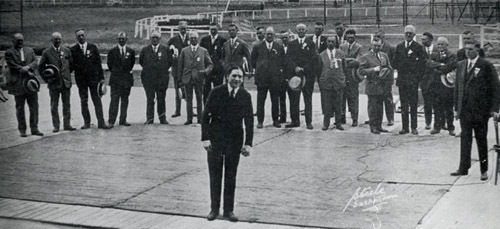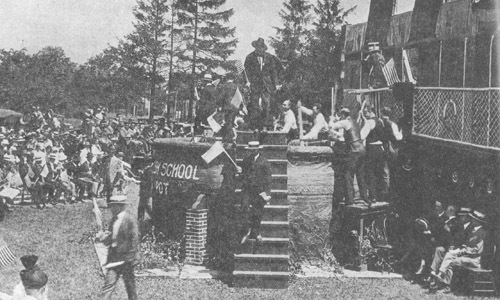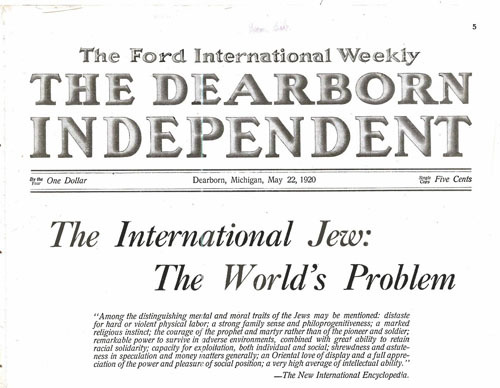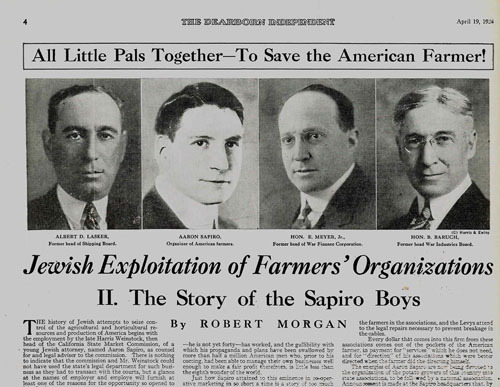Curse that Michael Rose. Small talk is impossible for this man of infectious interests and achievements. Prior conversations left me enchanted with his remarkable pictorial "Elvis" book, "Elvis: A Moment in Time, Four Days in '56," salivating for his American Diner stories with his PBS travel series, Great Drives, motivating me to follow my bliss with his Sir Ken Robinson Public TV special and piqued my obsession with his Aldous Huxley biopic to the point that I'm rallying funds myself, leaving my own projects to languish.
He is a Pied Piper of a producer, with 200 hours of edu-tainment to his credit for The History Channel, Discovery, PBS and more. Now his excavation of a court case brought against Henry Ford, long buried by the assembly line of unkosher baloney that kept that great American icon squeaky clean, has me sleepless and him on fire. I sat down with him to talk about the film he's working on that will bring this story to light.
MC: I hope you're happy. This untold piece of history has me retroactively enraged. A non-fiction biopic on PBS touched on Ford's stance against Jews, but I'd not heard of the Aaron Sapiro lawsuit.
MR: The historical series American Experience devoted several minutes to Ford's anti-Semitism and mentioned the trial but didn't name or explore the American experience of Aaron Sapiro. Sapiro's suit resulted in Ford shutting down his hate-spewing newspaper, The Dearborn Independent. My colleague, professor Victoria Saker Woeste, author of "Henry Ford's War on Jews and the Legal Battle Against Hate Speech" uncovered a hidden trove of documents that reveals the remarkable story of Sapiro's struggle for justice against the richest and most famous man in America. They are explosive.
MC: The content sounds incendiary. How will it look in your film?
MR: We'll use a variety of tools; live action, recreations of historical scenes, interviews with experts, narration, and animation of the early scenes of Aaron Sapiro's impoverished childhood. He was a poor kid who was orphaned when his father was killed by a trolley car. He sold matches on street corners, had his arms scorched when they ignited. His physical development was stunted by malnutrition and he probably looked like an easy target for bullies. It is possible he was molested in the orphanage and soon learned he was not alone in his victimization. So he organized the other children to band together to protect each other.
MC: "Aaron and the orphans" that's a great title. How did they subdue the attackers?
MR: The next time one of them was threatened, they'd sound an alarm and they'd all come running to ward off the thug.
MC: Did it work?
MR: Yes, and he learned that bullies, when confronted, back down.
MC: Seems his social consciousness was shaped when he was such a little boy.
MR: Yes. Early on, Aaron thought of the well being of others. He had leadership skills, brains and the ability to make things happen. He was charismatic. While practicing law, he saw that farmers were living a feudal existence in an industrial economy. He helped them get control of their lives in California, moving them from dirt floor hovels to proper homes, building libraries and schools. This phenomenal transformation led other farmers across the country to organize with his help, too. He became the leader of the farm cooperative movement.
MC: What provoked Ford to turn against Aaron and Jewish people at that time?
MR: It's a bit complicated and it's not quite clear exactly what flipped Ford's switch. But we do know, World War I war affected Americans in deep and lasting ways and the lesson Ford took away from it was particularly disquieting. He believed that Jews were to blame for the war. A mythical creature called "The International Jew" had started the war in order to profit from it.
MC: There was so much hogwash vilifying the Jews back then. My voicing a Jewish grandmother on the "Rugrats" cartoon series terrified my mother. She told me the drawing of the character resembled Anti-Semitic caricatures promoted by the Nazi propaganda film "The Eternal Jew" when she was young, and she feared the show fomented anti-Jewish feelings.
MR: I can understand her reaction. The '20s were one of the toughest, touchiest of times for the Jewish people around the world.
MC: Over the years, there have been many Hitler biopics and biographies, even in Germany, that touch on his negative propaganda and his feelings about Jews. But why no in depth film that looks at Ford's war against the "International Jew" and the Sapiro trial?
MR: Well his biographers either ignored it or several said they couldn't find the records. I can't really explain that because we found them. But it's interesting that the German government has gone to great lengths to educate its citizens about all aspects of the Holocaust and uses the schools, films and television to drive home the message that this must never happen again. They take the ramifications of hate speech very seriously. Yet, in this country we're still undecided about how to deal with hate and the unhinged conspiracy theories that foster these crazed notions. It's a debate I hope our film brings to the forefront and that people can use it to discuss the issues raised by this dramatic case.
MC: The fine line between freedom of speech and defamation continues to smear. Henry Ford did raise the minimum wage, hire blacks and handicapped workers at his factory. What changed his position on empowering the downtrodden?
MR: This is mostly another demonstration of the skill of Ford's PR people. I can only speak to the myth about Ford and his desire to empower his workers by raising their wages. Ford introduced the $5 a day wage (double the prevailing rate) not because he wanted to improve his employees' lives, but because his board convinced him that this would solve the absenteeism problem at his main Model T factory. Ford couldn't meet demand unless he found a way to keep people working in the brutish, dangerous and dehumanizing conditions of his Highland Park, Michigan plant. The catch with the wage doubling was that 50% of a worker's pay would be held in escrow for a year and they would only get the payout if they had perfect attendance and submitted to home inspections by Ford's Sociology Department who would make sure they were leading upstanding lives.
MC: Big Brother in action.
MR: Yes, and during that time he imposed many other restrictions on his largely immigrant workforce. He insisted that they all become citizens and disavow their cultural origins.
At the graduation ceremonies from the Ford English School he forced them to attend, there was a gigantic melting pot up on the stage, and the workers who were about to graduate would walk down into this melting pot on a ladder dressed in their native, ethnic costumes, whether it was from Italy or Poland or Greece or wherever. They would do a quick change and then come out dressed in business suits or plain American dresses, with each worker waving a flag to show their new loyalties.
MC: What a horrifying little class skit!
MR: Henry Ford was not just building Model T's; he was also building men in his own image. He really was trying to be a god. He started publishing his newspaper as a tool to transform Americans in the way he'd transformed his workforce. His PR people knew the benefit of casting Ford as a benevolent and farsighted leader. If only.
MC: Did folks forgive Ford's foibles because they liked his cars?
MR: Ford's Model T transformed, not only America but the world. Ford was very much a populist. Ordinary Americans admired and loved him, despite the outrageous things he said. They'd say, "Well, that's just Henry."
MC: Sounds like a sitcom: "That Darn Henry!"
MR: It's true. He almost single-handedly brought about a revival of square dancing in America in the 1920s, the only pure form of dancing in his view. Ford thought new forms of dancing, modern music, women's use of cosmetics, shorter hemlines, and the movies coming out of Hollywood were all immoral. An older, white, Christian, rural demographic followed his every word. In his mind, Jews were responsible.
In 1918, Ford bought The Dearborn Independent, with the idea of transforming it into an influential, nationally distributed weekly. He hired reporters, editors, and a business manager, redesigned the Independent's antiquated presses and recast them in Ford Motor plant facilities. Ford intended to use the newspaper, backed by company money, to promote his vision of America, engineering an efficient, morally upright population that disavowed war, tobacco, alcohol, jazz, and theater. Most of all, he wanted to expose the plague of Jewish influence on government and finance throughout the U.S.
Ernest Liebold, the man he selected to run the paper, saw his targeted readers, a largely, rural and white population, as a political base that would pave the way for a Ford Presidency. Ford was a populist hero of mythic proportions who had an agenda and knew how to manipulate his image.
MC: He seemed more like a petulant power monger, who played fast and loose with the truth.
MR: Ford was a man of contradictions. He confessed his ignorance beyond manufacturing automobiles, but that never prevented him from speaking out about of world affairs. As he eventually became a billionaire, he felt it was his right to share his opinions with the world, and reporters found that what he said made good copy. He usually didn't make any sense in his interviews and reporters would have to ask his spokesperson, William Cameron, editor of The Dearborn Independent, to interpret what Ford meant.
MC: Befuddled though he was, I intuit his influence was far from benign.
MR: Between 1920 and 1922, the Independent attacked many leading Jews by name and blamed Jews for everything from the Bolshevik Revolution and the First World War to bootlegged liquor, degenerate music like jazz, and scandalous movies. These inflammatory articles accused the Jews of conspiring to enslave Christians and destroy the "Anglo-Saxon" way of life.
MC: So how did Sapiro come into this?
MR: Aaron Sapiro's story intersected with the industrialist's evolving sense of America's place in the postwar world. Playing on the crushing boom and bust cycles that plagued American agriculture after the war, a series of articles in The Dearborn Independent attacked the agricultural cooperative movement that Sapiro head up as alien to the individualist spirit of American husbandry. The pieces in the Independent accused Sapiro of defrauding American farmers to advance an international Jewish conspiracy.
The attacks all but dared Sapiro to sue for libel. "Jewish Exploitation of Farmers' Organizations," shrieked a typical headline. Full of outright errors, as well as anti-Semitic innuendo, the articles distorted Sapiro's career, impugned his motives, and accused him of professional malpractice. Sapiro demanded a retraction in early 1925, but the Independent's editors ignored him, responding instead with several more offensive articles. Three months later, Sapiro filed suit in federal court requesting damages of $1million, an immense amount at the time. By contrast, Ford earned that sum in two and a half days. The national press took immediate notice, describing the case as a "David-versus-Goliath" contest.
MC: This is a great set up for Sapiro's long censored success story. I get riled up just listening to you.
MR: Thank you. As you can see, so do I. I'm looking forward to being able to talk about the impact The Dearborn Independent had when it landed in the offices of Jewish clergy, lawyers, intellectuals and activists like a series of perfectly timed grenades. I'll also look at the climate of anti-Semitism here and abroad. Jewish Americans who fought bravely in the military faced degrading treatment from their commanders and a cold shoulder from fellow citizens upon their return. They ware aware of the rise of hate literature directed at Jews in Germany. This was particularly disturbing to German-American Jews, who made up the vast majority of the Jewish population in this country at the time. We'll talk about the growth of a resurgent Ku Klux Klan and the lynching of Leo Frank, a Jewish factory superintendent in Atlanta, who was wrongly accused of murdering a young girl. All of which spread fear throughout the American Jewish community.
Sapiro was keenly aware of all these forces and knew that he was putting himself at risk challenging Ford and popular American opinion.
MC: I've learned that Ford's need to wield his power and control over his workers, the unions, often led to violence. Was Sapiro every physically threatened?
MR: I don't believe so.
MC: So, spoiler alert: did Sapiro win the trial?
MR: Yes and no. Ford knew he wasn't going to win and was afraid to testify. He was brazen as long as he hid behind his phalanx of lawyers, his newspaper and his security detail, but he didn't have the courage to sit in the witness stand and face Aaron Sapiro. To keep from being called on the stand, he had Harry Bennett, his chief thug, engineer a mistrial.
MC: How?
MR: We'll reveal how he did this in our film.
MC: You're such a tease. How did the mistrial sit with Sapiro?
MR: Even though Sapiro was confident he could prevail in a new trial, he didn't welcome the expense or the time it would take. He accepted Ford's offer of an apology with the promise that the automaker would shutter The Dearborn Independent if he dropped his lawsuit. But forcing Ford to apologize and shut down the paper only gave him fleeting vindication.
MC: Do you meant to tell me that the Ford-instigated anti-Jewish sentiment did not subside?
MR: The Dearborn Independent was shut down but millions of copies of the collection of articles in book form continued to be published as a four volume set The International Jew in Germany and South America. And Ford's half-hearted attempts to stop the publishers were rebuffed because Ford hadn't copyrighted the books.
MC: Arrgh! What became of Aaron Sapiro and his work after the truth of the trial was suppressed?
MR: Sapiro returned to California, but never reengaged with the field that won him his reputation and fame. He slipped into obscurity during the Depression and died in 1959.
MC: A bittersweet tale that must be told!
MR: It's my goal to reveal the courage it took for Aaron Sapiro to challenge the richest and most famous man in America. As Aaron said, he wanted to show Ford that "one Jew is not afraid to fight him for his bigotry and his malice, right in his own jurisdiction, under his own battlements and in the face of his own horde of detectives and able lawyers." It was a trial of the century and one that shows what it takes to stand up to hate, even today.
MC: I'm getting goose bumps, like I do at the end of any great spellbinder. My skin writes its own reviews. How would Sapiro's and Ford's families feel about this material coming to light now?
MR: Sapiro's remaining family is overjoyed at the possibility. Not sure about the Fords, but, to its credit, the Ford Motor Company has gone to great lengths to show its support for the Jewish people, as the sole sponsor of the television airing of "Schindler's List," by its generous donations to Jewish causes and by continuing to do business with Israel after the Six Day War. It looks like the next CEO of Ford could be the very able, Mark Fields, the current Chief Operating Officer, who happens to be Jewish.
My intent in this film isn't to tarnish the Ford Motor Company's reputation but to highlight the life of Aaron Sapiro and reemphasize why it's important to challenge hate, no matter what the personal cost. I welcome the opportunity to interview Henry Ford's living heirs to discuss his legacy. Reconciliation is important.
------------------------------------------------
And I'll have to reconcile myself to promoting this cause and waiting for Michael to bring Aaron Sapiro's story to big and small screens everywhere.
For more information about The Trial of Henry Ford contact Michael Rose Productions: TrialofHenryFord@gmail.com, or (310) 391-2020.
And/or: log on to the International Documentary Association website to make a tax deductible donation to this project.



